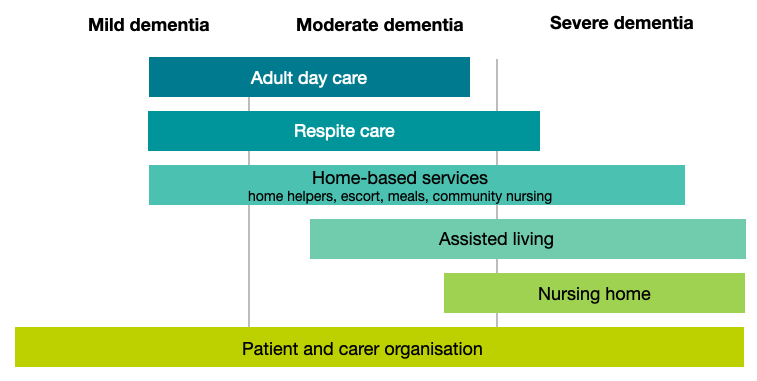Outline of services
What are the needs that services and facilities should meet?
The needs of people with dementia and their informal (family) carers change during the course of dementia. At the early stage, people with dementia and their carers need services that support them in maintaining normality and continuing their lives at home with as little changes as possible. At the moderate stage, services that are provided in the community may be required to complement support in the home. At the advanced stage, the growing need for assistance may necessitate to replace home and community-based support by institutional services.
| Home | Community | Institutions |
| Home emergency call Mobile nursing teams Home helpers Meals services | Peer groups Carer support groups Respite care Adult day care centres | Residential care Group living / Assisted living Special care units Palliative care |
Services providing support in the home
Services that provide support in the home have a number of advantages. There is no change of the environment – so no adjustment problems occur, previous interests and hobbies as well as social relations can be maintained, and costs are relatively low. Services in the home may not be sufficient in case of an acute illness of the person with dementia or the carer, for people who wander frequently or are persistently incontinent, aggressive, or in case of home hazards (gas, fire, water).
Home emergency call
24/7 helpline activated by a device that can be worn on the wrist, provides monitoring and convenient and rapid access to emergency services.
Mobile nursing teams
Professional services that take care of medications, injections, personal hygiene, incontinence care and providing advice on dealing with challenging behaviours.
Home helpers
Specially trained staff who help with cleaning, shopping, supervising people in the home.
Meals services
Many organisations offer meals that are brought to people’s homes at any time during the day.
Services providing support in the community
Peer groups
Regular meetings of people with early-stage dementia where they can exchange experiences, participate in activities, and receive emotional support.
Carer support groups
Regular meetings of family and other informal carers where they receive information about the diseases of their loved ones, and acquire skills regarding communication, activities for people with dementia, as well as available services and resources.
Respite care
Some organisations temporarily take care of the person with dementia outside the home.
Adult day care centres
These facilities admit 10 – 20 guests for several hours during the day or all day long, for one or more days per week, where food, supervision and an activity programmes are provided.
Institutional services
Assisted living
Assisted living facilities are appropriate for people with dementia who do not have many medical problems but need support with more complex activities of daily living. Residents usually live in a private apartment and staff is available for assistance around the clock and for 7 days a week. „Assisted living“ is often referred to as “residential care”, but this is not quite the same. The main difference between assisted living and residential care is the size of the setting and the cost for services provided, which can be similar. Due to smaller number of residents living in residential care homes, a more individualized approach can be applied. Monthly costs are also generally smaller compared to larger assisted living facilities.
Special care units in nursing homes
Ideally, special care units are small-scale and homelike with 8 -12 individuals. The units are especially designed for people with dementia, providing resident safety through door locking systems and signposting. Supervision is provided 24/7 by staff who are trained to manage behavioural and psychological symptoms of dementia.
Palliative care
Palliative care can be provided within other types of institutional services (e.g. in special care units) by professionals educated in providing palliative care. There is also possibility in the final stages of life to move to a palliative nursing home to receive more specialized palliative care.

